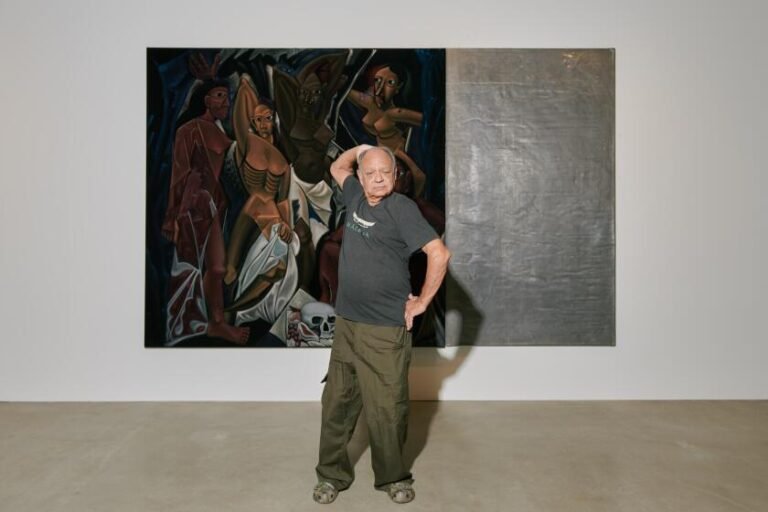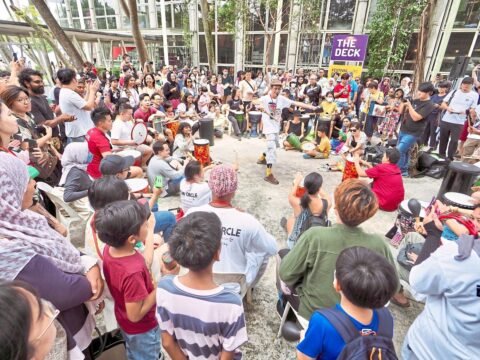Stoner comedy legend, actor and Chicano art curator collector Cheech Marin will be honored this year at the 38th annual Hispanic Heritage Awards.
The Hispanic Heritage Foundation named Marin as a recipient of the 2025 Hispanic Heritage Award for the arts on Tuesday, one of several honors bestowed on notable public figures for their accomplishments and cultural contributions to the Latino communities.
Past awardees at the Hispanic Heritage Awards include Bad Bunny, America Ferrera, Becky G, J Balvin and others. Marin will be awarded alongside National Public Radio journalist and “Alt.Latino” host Felix Contreras and Rizos Curls co-founder and CEO Julissa Prado.
“I’m extremely honored to be receiving this Hispanic Heritage for Arts Award,” Marin said in a press release. “I accept this recognition with deep gratitude and a commitment to continue uplifting voices, building bridges, and honoring the legacy of those who came before us.”
Read more: NPR’s Felix Contreras opened minds to Latin alternative music. He’s finally getting his due
Having spent his childhood in South-Central L.A. and the San Fernando Valley, Marin’s comedy career kicked off in the late 1960s, when he fled to Canada to avoid being drafted during the Vietnam War. It was during that time that he first met his future comedy partner Tommy Chong — and the rest is burned into history.
“For over five decades, Cheech Marin has reflected our cultural impact on America and the world as a comedian, actor, director, art collector, and humanitarian,” said Antonio Tijerino, the president and CEO of the Hispanic Heritage Foundation, in a press release. “His groundbreaking work has not only entertained but enlightened. We are thrilled to pay tribute to Cheech and the other 2025 Honorees and tell their stories to inspire, unite, and mobilize other generations.”
Cheech and Chong’s blazing success first reached national attention after the release of their first comedy album “Cheech and Chong” in 1971. The 11-track LP was nominated for a comedy recording award at the 1972 Grammy Awards and generated the famous “Dave’s not here” line. Their second album, “Big Bambú,” was nominated for a Grammy in the same category at the 1973 award ceremony.
In 1978, the duo released the stoner comedy feature film, “Up in Smoke,” which was based in L.A. Though it was critically panned, the film became a cult classic and was added to the Library of Congress’ National Film Registry in 2024.
Marin’s 1987 film “Born in East L.A.” — which includes a spoof of Bruce Springsteen’s “Born in the U.S.A.” — was acclaimed by critics for blending of comedy with such serious subject matters as deportation and living as an undocumented person in the U.S.
Read more: Always a collector, Cheech Marin brings his art to Riverside
“Without saying so much as a single word that could be even remotely described as preachy, Cheech Marin makes his points about the second-class nature of American citizenship for ethnic minorities and the desperate situation in which illegal aliens find themselves,” The Times wrote in a 1987 review of the movie.
In recent years, Marin is perhaps best known for his work as a collector of Chicano art. After being a lifelong gatherer of art, the Cheech Marin Center for Chicano Art & Culture of the Riverside Art Museum opened to the public in June 2022.
Many consider the museum to be the largest private collection of Chicano art in the world, with more than 550 paintings, drawings, sculptures and photographs from Marin’s personal collection will be on permanent rotation. Nicknamed “the Cheech,” the 61,420-square-foot, two-story art museum and education center resides in what used to be the downtown Riverside Public Library, and has displayed works by artists Chaz Bojorquez, Judithe Hernández, Frank Romero, Patssi Valdez and others. It’s considered the only permanent art space to exclusively showcase Chicano and Mexican American art in the country.
“You don’t have to be Chicano to love and appreciate this work,” Marin told The Times in 2022. “Just like I don’t have to be French to appreciate Impressionism or German to appreciate Expressionism. We recognize it as part of the conversation in the history of art. And now we are part of that conversation in a more concentrated effort than we’ve ever had before.”
Get our Latinx Files newsletter for stories that capture the complexity of our communities.
This story originally appeared in Los Angeles Times.





